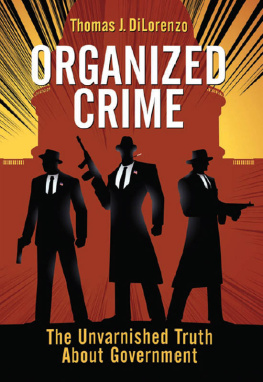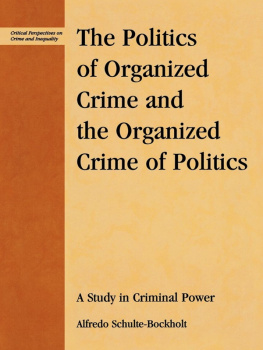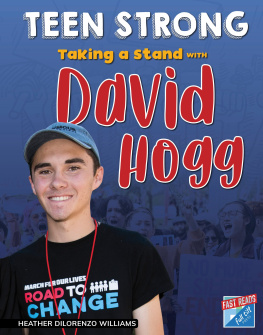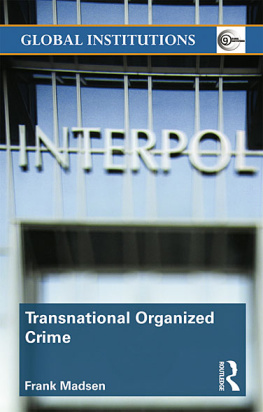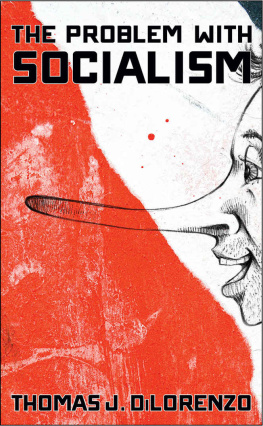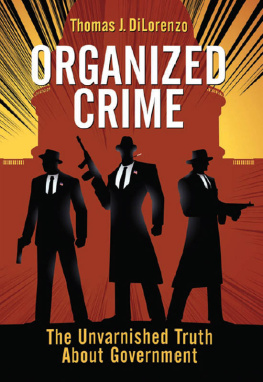Thomas J. DiLorenzo - Organized Crime
Here you can read online Thomas J. DiLorenzo - Organized Crime full text of the book (entire story) in english for free. Download pdf and epub, get meaning, cover and reviews about this ebook. year: 2012, publisher: Ludwig von Mises Institute, genre: Politics. Description of the work, (preface) as well as reviews are available. Best literature library LitArk.com created for fans of good reading and offers a wide selection of genres:
Romance novel
Science fiction
Adventure
Detective
Science
History
Home and family
Prose
Art
Politics
Computer
Non-fiction
Religion
Business
Children
Humor
Choose a favorite category and find really read worthwhile books. Enjoy immersion in the world of imagination, feel the emotions of the characters or learn something new for yourself, make an fascinating discovery.
- Book:Organized Crime
- Author:
- Publisher:Ludwig von Mises Institute
- Genre:
- Year:2012
- Rating:4 / 5
- Favourites:Add to favourites
- Your mark:
- 80
- 1
- 2
- 3
- 4
- 5
Organized Crime: summary, description and annotation
We offer to read an annotation, description, summary or preface (depends on what the author of the book "Organized Crime" wrote himself). If you haven't found the necessary information about the book — write in the comments, we will try to find it.
Organized Crime — read online for free the complete book (whole text) full work
Below is the text of the book, divided by pages. System saving the place of the last page read, allows you to conveniently read the book "Organized Crime" online for free, without having to search again every time where you left off. Put a bookmark, and you can go to the page where you finished reading at any time.
Font size:
Interval:
Bookmark:
Organized Crime
The Unvarnished Truth About Government
The Ludwig von Mises Institue dedicates this volume to all of its generous donors and wishes to thank these Patrons, in particular:
Louis Carabini

Arthur L. Loeb; Sheldon Rose

Anonymous; Robert D. Bowers; John E. Burgess; Sherry Klein Burgess; Andrew S. Cofrin; Donald K. Cowles; Michael H. Denyer, MD; Joel Hall; James D. Heiple; Dr. Guelcin Imre and Prof. Dr. Hans-Hermann Hoppe; The Robert and Ann Kennedy Family Foundation; James E. Kluttz; Richard J. Kossmann, MD; David and Ann Langdon; Joe R. Lee; Bailey Liipfert; Rafael Perez-Mera, MD; Gary Mullennix; Mr. and Mrs. R. Nelson Nash; David Sims; Mr. and Mrs. Walter F. Woodul III

Donald E. Bently; Bob and Rita Bost; Roman J. Bowser; Roger and Angela Box; Justin Bradfield; Alfred R. Davie; Philip Egan; Michael Fox; Steven C. Frazer; Todd S. Gibson; Gary T. Gorski; T.J. and Ida Goss; Nadine L. Grabow; Bob Guess; James E. Hall; John A. Halter; Dr. Frederic Herman; Kenneth C. Holton; Robert S. James; Dr. and Mrs. Jason E. Jewell; Scott A. Kearl; Bernard Koether; Jonathan Leckie; Leopoldo Leyendecker; Richard and Donna Mancini; Michael, Dawn, and Marina McKay; Donald and Linda Miller; Kenneth S. Morris; Terence Murphree; James Rutledge Roesch; Thomas S. Ross; James R. Sattler; John H. Scacchia; Donald E. Siemers; Silver-Investor.com; Norman K. Singleton; Henri Etel Skinner;
G. Keith Smith, MD; Edward M. Soloko; Albert W. Stewart;
Robert J. Stewart; Hubert John Strecker; Stephan P. Sykes; Harry E. Teasley, Jr.; Kenneth S. Templeton; Reginald Thatcher; Dr. Michael Thibodeaux; Brian Thomson; Margaret C. Thomson; David W. Tice; Quinten and Marian Ward; Wayne G. Whitmore, MD; Thomas G. Winar, Sr.
Organized Crime
The Unvarnished Truth About Government
THOMAS J. DILORENZO
MISES
INSTITUTE
AUBURN, ALABAMA

Copyright 2012 by the Ludwig von Mises Institute. Permission to reprint in whole or in part is gladly granted, provided full credit is given.
Ludwig von Mises Institute
518 West Magnolia Avenue
Auburn, Alabama 36832
mises.org
ISBN: 978-1-61016-255-5 (paperback edition)
ISBN: 978-1-61016-256-2 (hardback edition)
To Laura
and all of those like her
who have enriched their lives
by discovering the literature of liberty.
T he late Milton Friedman once said that if the average tariff rate in America was a few percentage points lower than it would otherwise be thanks to influence of academic economists, that would more than justify all of their salaries and then some because of the wealth-enhancing effects of freer trade. Friedman was correct as far as the story goes, but at the time that he made the comment the mainstream of the economics profession was mostly involved in supporting the wealth-destroying efforts of the parasitic welfare/regulatory state by spinning myriad tales of market failure and recommending endless government intervention.
Market failure theorists, whose epicenter was for many years the Harvard and M.I.T. economics departments, had three main characteristics: First, they concocted mathematical models that were usually far removed if not totally detached from economic reality. Indeed, a realistic theory that could explain real-world phenomena was (and is) often viewed as pedestrian and unscholarly. Only impossible-to-understand and seemingly trivial mathematical manipulations were said to be worthy of economic science. The mainstream of the economics profession has long suffered from physics envy and has sought to model the unmodelablehuman actionto make their science appear to be physics-like and scientific.
The second characteristic of the market failure theorists is a consistent application of what UCLA economist Harold Demsetz labeled the nirvana fallacy. The game is played as follows: First, construct a totally unrealistic theory of perfect competition that assumes away all real-world competition with assumptions of perfect information, homogenous products and prices, free or costless entry and exit from industry, and many firms. Second, compare real-world markets to this utopian Nirvana state and condemn the markets as imperfect or failed.
The third characteristic of market failure theories is to recommend intervention by presumably perfect government that is assumed to suffer from no failures and which will correct the failures of the market.
There are two schools of thought in the field of economics that never accepted this statist charade as being legitimate: the Austrian School and the Public Choice School. The Public Choice Schoolat least the Virginia School variant of ituses the economists understanding of incentives to study the behavior of government and all of its appendages (voters, bureaucrats, politicians, interest groups, etc.). Understanding how government actually works in this way will cure anyone of the stupidity of simply assuming that government is capable of correcting perceived shortcomings of the market.
The Austrian School never accepted the foolish Nirvana fallacy approach to economic modeling for obvious reasons, namely, it is intellectually dishonest. Rather than condemning markets as being imperfect because market participants possess less than perfect information (as though anyone does), for example, Austrian economists will explore the ways in which market participants make use of the information that is available to them and acquire new information. The object is always to understand how the economic world works, not to provide what appears to be a scholarly defense of government interventionism, as is the case with the market failure theorists.
Austrian economists also study how government works and do not simply assume that it is some kind of benevolent and omniscient mechanism that serves as a corrector of market failure. Examples would be Ludwig von Mises book, Bureaucracy, or the numerous writings of Murray N. Rothbard on the machinations of governments throughout history. There are many more examples in the Austrian literature.
Your author considers this book to be a collection of essays in the tradition of Austrian political economya combination of applied economics and the study of governmental reality. Unlike mainstream economists who are content to spin mathematical model after mathematical model which explain little or nothing about the real world, your authors focus has always been just the oppositeto use economic understanding to gain a better understanding of how the political-economic world works. Austrian economics is indispensable to succeed at this task.
The book is divided into six sections: Coercion and Regulation analyzes various aspects of government regulation of business; Politics and Thieves is of course about the inherent nature of government; Centralization versus Liberty discusses the never-ending quest by statists to monopolize and centralize political power so as to isolate themselves as much as possible from public influence; Money and the State describes the myriad evils of central banking, which was always thought of by its original proponents in America as an engine of corruption; Workers and Unions discusses various labor union myths and superstitions that too often cloud the publics thinking about the reality of labor markets; and Truth and Lies about Markets is a taxonomy of some of the main market-failure myths that have long been used to illegitimately advance the cause of economic interventionism, as well as some newer ones.
Next pageFont size:
Interval:
Bookmark:
Similar books «Organized Crime»
Look at similar books to Organized Crime. We have selected literature similar in name and meaning in the hope of providing readers with more options to find new, interesting, not yet read works.
Discussion, reviews of the book Organized Crime and just readers' own opinions. Leave your comments, write what you think about the work, its meaning or the main characters. Specify what exactly you liked and what you didn't like, and why you think so.

